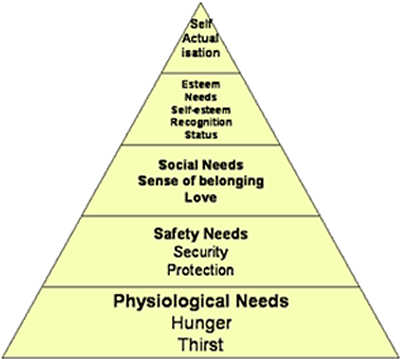4 Aids to personal growth

In life, many people get stuck somewhere on Maslow’s Hierarchy of Needs. They just settle at a certain level and never go higher. The vast majority of humans are stuck in the bottom two levels working just to survive. A few manage to move beyond the next level of belonging to a group or tribe where they are known and valued – they are willing to risk vulnerability and trust in order to create true community. And only a small percentage embrace the pain involved in seeking to go to the highest level – self-actualization.
 The growth process is hard. It is filled with pain and disappointment and it requires a lot of perseverance. God has set it up so that no one can go through the growth process by themselves. We need mentors. In Christianity we call the growth process “discipleship;” to be discipled is to admit your need for help in growing.
The growth process is hard. It is filled with pain and disappointment and it requires a lot of perseverance. God has set it up so that no one can go through the growth process by themselves. We need mentors. In Christianity we call the growth process “discipleship;” to be discipled is to admit your need for help in growing.
If a person really wants to grow, he or she will not only embrace the necessity of pain in moving from one level to the next, they will also embrace their need for help in the process. They will have the humility to see that others who have gone on ahead want to reach down and give them a hand up. They will risk trusting those who offer a coaching relationship or free advice. They’ll see the importance of embracing opportunities for growth and will seek out experiences which bring pain and the possibility of growth. They’ll understand and appreciate rather than resist these aids to growth.
Think of Maslow’s Hierarchy of Needs as a mountain. Each of the following four aids to growth can be compared with a piece of equipment that helps the mountain climber to scale higher up the mountain. And if working toward the highest level of self-actualization sounds too selfish, think of the growth process in terms of stewardship of the talents and life that God has given you.
1. Coaches – You access a coach with a proper attitude – a humble, coachable attitude – and by actively seeking the coach’s help, by asking for their time and by asking questions and requesting feedback and advice.
2. Mirrors – A mirror shows you what you look like when someone else sees you. You may be wounded and selfish and oblivious to that fact unless someone takes the risk of giving you feedback. Looking in the mirror is a risk because it exposes blemishes and we may not know if we can trust the mirror. Therefore, anyone who risks giving honest feedback deserves to be thanked.
3. Opportunities – Life brings you a series of opportunities dressed up as problems. Most people see the problems life presents with their natural eyes and never switch on the faith-vision needed to see the opportunity behind the problems. We set our expectations and put ourselves in autopilot and then a problem arises which necessitates a course correction. We have to switch to manual pilot and make a change. Most people resist change, but who’s to say that the new course isn’t a better one? Embrace the change as an opportunity and you grow. Resist it and you stagnate.
4. Tests – Related to opportunities are tests. Tests are just a gauge showing where you are in your spiritual journey. The classic test was God testing Abraham concerning his willingness to sacrifice Isaac. Tests are often about our priorities or our willingness to say “yes” to God when we don’t understand what he’s doing. Inevitably if we fail a test, God will give it to us again in the future until we’re able to pass it.
Comments (3)
Leave a Reply Cancel reply
More Posts
![]()



love it dad – good stuff.
This is really good stuff, Seth. Faith!!! I am so grateful that, even thru the pain and major dissappointment, I am able to walk this out trusting that God’s ways are above mine. I do wish I had someone’s shoulder to cry on though. Could you please pray about that for me…
Seth, Maslow’s heirarchy is one of the theoretical frameworks I admire and reference the most (read: I believe it has few wholes and is applicable to real life). Thanks for always raising questions that challenge me to think deeper and grow. Your post on AA also struck a chord as I have church-averse friends who feel they get all they want at Alanon… As I read “Irresistible Revolution”, I am seeking the Father’s heart about how I can create more genuine community where I am at… Blessings to you in this Holy week (Passover last night was amazing!! Have you had a chance to participate in Seders?).